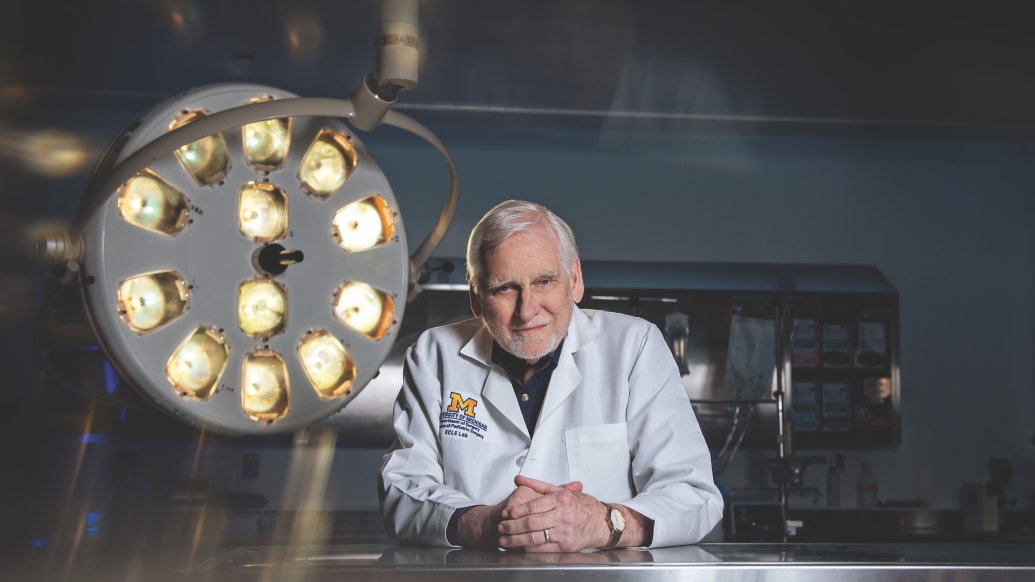Dr. Robert Bartlett, Surgeon and Pioneer of ECMO Technology, Dies at 86
Dr. Robert H. Bartlett, an esteemed Michigan surgeon whose groundbreaking work revolutionized life support technology, has died at the age of 86 after a long illness. Widely regarded as the Father of ECMO (extracorporeal membrane oxygenation), Dr. Bartlett’s work has saved more than 100,000 patients worldwide and fundamentally reshaped modern critical care.
Bartlett’s remarkable journey began where it also came full circle — at the University of Michigan, where he was born, studied, and later spent most of his career as an active emeritus surgeon and professor. Medicine ran in his family; his father was a surgical resident at the same hospital when Bartlett was born. After earning his undergraduate degree from Albion College and graduating cum laude from the U-M Medical School in 1963, Bartlett trained in general and thoracic surgery at what is now Brigham and Women’s Hospital in Boston, later refining his research skills at Harvard Medical School.
His early academic curiosity would eventually lead to one of the greatest breakthroughs in modern medicine — the development of ECMO.
The Birth of ECMO and a New Era in Critical Care
In 1976, while serving on the faculty at the University of California, Irvine, Dr. Bartlett led the team that performed the world’s first successful long-term ECMO treatment on a newborn known as Baby Esperanza. The infant, born with severe lung damage, recovered after three days on the life-support circuit — a moment that changed the course of neonatal and adult intensive care forever.
When Bartlett returned to the University of Michigan in 1980, he built on that success, refining ECMO for broader use and founding the Extracorporeal Life Support Laboratory (ECLS) — a hub for ongoing research and training that continues to educate more than 100 students, residents, and investigators each year.
Dr. Bartlett’s pioneering spirit also extended beyond academia. He founded MC3 Cardiopulmonary, later acquired by Medtronic, and helped establish the Extracorporeal Life Support Organization (ELSO) in 1989, now a global network supporting hospitals, researchers, and clinicians in over 60 countries.
Legacy and Global Impact
Today, more than 261,000 critically ill patients have received ECMO treatment across 800 hospitals in 66 countries. The technology became a crucial lifeline during the COVID-19 pandemic, helping thousands of patients with respiratory failure survive when conventional therapies failed.
“Without Dr. Bartlett, there is no ECMO,” said Christine Stead, CEO of ELSO. “He changed the world — not only through science but through his kindness, mentorship, and relentless curiosity.”
Dr. Justin B. Dimick, Chair of the U-M Department of Surgery, described Bartlett as “a beloved teacher and visionary.” He added, “Dr. Bartlett never came across a subject he didn’t meet with enthusiasm, or a student he didn’t inspire. His influence extends beyond medicine — he made us better people.”
A Surgeon, Scientist, and Musician
Outside the lab, Bartlett was as multidimensional as his research. He was a musician, author, and lifelong learner, playing the euphonium and double bass in local bands, and even founding the Life Sciences Orchestra at U-M. His creativity found its way into literature, too, as the author of two novels.
He is survived by his wife, Wanda Bartlett, his children Karl, Keith, and Karen, and several grandchildren. Donations in his memory can be made to the Robert H. Bartlett ECLS Laboratory, the University of Michigan Men’s Glee Club, or the University Musical Society.
Remembering a Giant in Medicine
Dr. Robert Bartlett’s career was defined by compassion, innovation, and an unshakable belief in the potential of science to save lives. His pioneering work in ECMO technology not only extended the boundaries of what medicine could do but also offered hope to generations of patients once thought beyond saving.
As colleagues at Michigan Medicine reflected this week, his legacy lives on — in every child who breathes easier, every patient who survives critical illness, and every young doctor inspired by his example.
Or, as Bartlett himself once said in simple clarity:
“Surgeon scientists solve big, clinical problems.”
He did exactly that — and changed the world.




